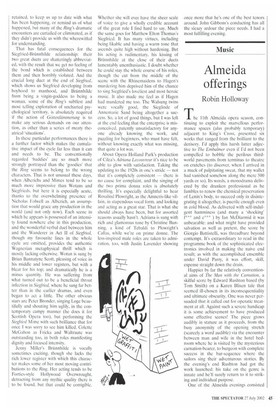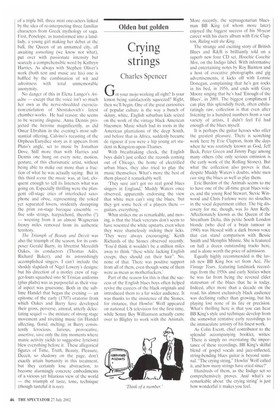Almeida offerings
Robin Holloway
The 11th Almeida opera season, continuing to exploit the marvellous performance spaces (alas probably temporary) adjacent to King's Cross, presented six works that ranged from the brilliant to the derisory. I'd apply this harsh latter adjective to The Embalmer even if I'd not been compelled to hobble the perilous thirdworld pavements from terminus to theatre on crutches (to discover, when I arrived in a muck of palpitating sweat, that my wallet had vanished somehow along the mere 500 yards or so). Its words, a monodrama delivered by the drunken professional as he fumbles to renew the chemical preservation of Lenin's body, to succeed only in disintegrating it altogether, is puerile enough even in cold blood. As delivered with self-indulgent hamminess (and many a 'shocking' f" and c' ) by Ian McDiarmid it was unbearable: and what might have provided salvation as well as pretext, the score by Giorgio Battistelli, was threadbare beyond contempt. It's extraordinary to read in the programme book of the sophisticated electronics involved in making the naive end result; as with the accomplished ensemble under David Parry, it was effort, skill, expense straight down the drain.
Happier by far the relatively conventional aims of The Man with the Carnation, a skilful score by Edward Rushton based (by Tom Smith) on a Karen Blixen tale that seemed ill-chosen in its inconsequentiality and ultimate obscurity. One was never persuaded that it called out for operatic treatment at all. Against such a severe handicap it is some achievement to have produced some effective scenes! The piece grows audibly in stature as it proceeds, from the busy anonymity of the opening stretch (scarcely a word audible) via the encounter between man and wife in the hotel bedroom where he is visited by the mysterious carnation-bearer, to burgeon with complete success in the bar-sequence where the sailors sing their adventurous stories. By the evening's end Rushton had got the work launched: his take on the genre is innate and he'll surely return to it to striking and individual purpose.
One of the Almeida evenings consisted of a triple bill, three mini one-acters linked by the idea of re-interpreting three familiar characters from Greek mythology or saga. First, Penelope, as transformed into a landlady, a young girl making her debut at the ball, the Queen of an unnamed city, all awaiting something (we know not what), put over with passionate intensity but scarcely a comprehensible word by Kathryn Harries. As always with Stephen Oliver's work (both text and music are his) one is baffled by the combination of wit and adroitness with total unmemorable anonymity.
No danger of this in Elena Langer's Ariadne — except that the voice isn't so much her own as the nerve-shredded excruciation/etiolation of Shostakovich's latest chamber-works. He had reason: she seems to be wearing disguise. Anna Dennis projected the heroine magnificently, as did Omar Ebrahim in the evening's most substantial offering, Calvino's recasting of the Orpheus/Eurydice story as it appears from Pluto's angle, set to music by Jonathan Dove. Still more than with Harries and Dennis one hung on every note, motion, gesture, of this charismatic artist, without being able to make out more than a fraction of what he was actually saying. But in this third scena the music was, at last, eloquent enough to tell its listeners what was going on. Especially thrilling were the plangent off-stage cries of interlocked saxophone and oboe, representing the yoked yet separated lovers, stridently disrupting the prim on-stage baroque ensemble — five solo strings, harpsichord, theorbo (!) — wresting from it an almost Wagnerian frenzy miles removed from its authentic territory.
The Triumph of Beauty and Deceit was also the triumph of the season, for its composer Gerald Barry, its librettist Meredith Oakes, its conductors (Thomas Ades, Richard Baker), and its astonishingly accomplished singers. I can't include the shoddy slapdash of Nigel Lowery's designs; but his direction of a motley crew of rugger-louts squashed into St Trinian uniforms (plus plaits) was as purposeful as their visual aspect was gruesome. Both in the sublime Handel that began the evening — an epitome of the early (1707) oratorio from which Oakes and Barry have developed their gross, perverse, amoral, utterly deicetating sequel — the mixture of strong stage movement and rivetting music (in Handel affecting, florid, melting; in Barry consistently ferocious, furious, provocative, assertive, save only the tiny moments where manic activity yields to suggestive lyricism) blew everything before it. These allegorical figures of Time, Truth, Beauty, Pleasure, Deceit, so shadowy on the page, don't exactly attain humanity in this treatment, but they certainly lose abstraction, to become alarmingly concrete embodiments of a vicious yet hilarious view of the world — the triumph of taste, tone, technique (though tasteful it is not).

































































 Previous page
Previous page